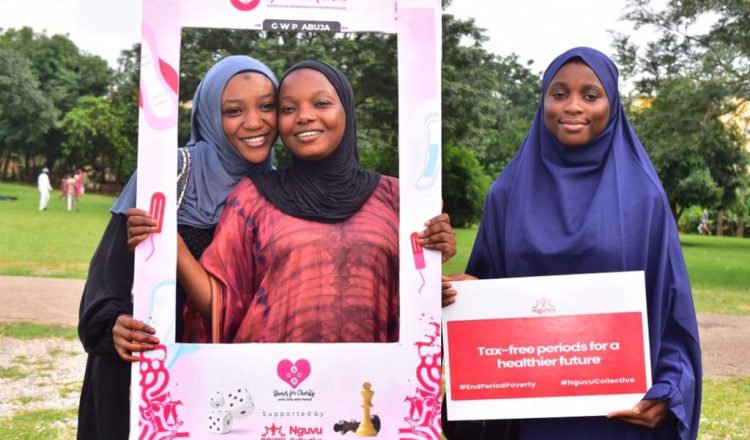In a bold move to combat period poverty and its detrimental effects on women and girls in Nigeria, Nguvu Change leaders, Margaret Aladeselu and Mary Aliyu spearheaded a powerful visual campaign on Africa’s Women’s Day (July 31). The campaign, aimed at raising awareness and advocating for the removal of taxes on menstrual products, shines a spotlight on the dire situation faced by over 37 million Nigerian women and girls struggling to afford basic menstrual hygiene products.
The rising cost of sanitary products has exacerbated period poverty, pushing essential items out of reach for a significant portion of the population. This issue not only impacts menstrual health but also contributes to reproductive tract infections (RTIs), and gynecological problems, and hinders progress towards the Sustainable Development Goals related to health, education, economic and gender equality.
The visual protest, organized by Aladeselu and Aliyu, featured evocative placards that illustrated the harsh alternatives women resort to due to unaffordability, such as using jute bags, cloth, or sometimes nothing. Participants from various backgrounds joined the campaign, with some opting to cover their faces to maintain anonymity while sharing their personal stories of battling acute period poverty.
Mary Aliyu, a tireless advocate for menstrual health and hygiene, particularly in underprivileged communities, serves as the Abuja Chapter Coordinator for the ‘Caring for Girls with Period’ initiative. She stated, “This visual campaign and all the work I do aim to generate awareness about the rampant period poverty across Nigeria. The basic right to menstrual health, hygiene, good education, and dignity should be within the reach of every adolescent girl and woman.”\
Read also: Something To Ponder: I Dare You To Read!
Aliyu’s efforts have directly impacted over 400 girls, providing them with education on menstrual hygiene and essential supplies. She emphasizes the urgent need for broader community engagement and support for menstrual health initiatives. Her petition, which draws attention to the high price of pads in Nigeria, appeals to the Ministry of Health in conjunction with the Ministry of Education to make sanitary pads available for free in schools and hospitals for young girls.
“It is important to understand that period poverty is not just about the absence of hygiene products,” Aliyu concludes. “It is the direct result of undermining the needs of women and the normalization of gender inequality. Yes, women need sanitary pads, but they also need respect and equality. I hope this visual campaign has provided visibility into the struggles of millions of underserved Nigerian women.”
Nguvu Changeleaders is an organization dedicated to empowering women and girls through advocacy, education, and community engagement, aiming to eliminate period poverty and promote gender equality.





